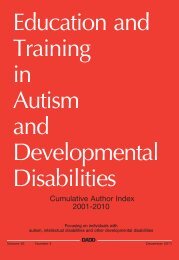etadd_47(3) - Division on Autism and Developmental Disabilities
etadd_47(3) - Division on Autism and Developmental Disabilities
etadd_47(3) - Division on Autism and Developmental Disabilities
You also want an ePaper? Increase the reach of your titles
YUMPU automatically turns print PDFs into web optimized ePapers that Google loves.
ities. Scholars have argued that d<strong>on</strong>or agencies<br />
frequently did not take local culture <strong>and</strong><br />
interests into account in the past, even when<br />
implementing small-scale local programs<br />
(Chaudhry & Owen, 2005; Kalyanpur, 1996).<br />
D<strong>on</strong>or agency-sp<strong>on</strong>sored programs have often<br />
come directly from the West, <strong>and</strong> have been<br />
transplanted to developing countries. They<br />
have been implemented by a mixture of local<br />
staff <strong>and</strong> imported c<strong>on</strong>sultants. Because the<br />
d<strong>on</strong>ors have provided the funding, they have<br />
had the ability to influence the types of programs<br />
used (Kisanji, 1998). In many cases, the<br />
programs implemented combined curricula<br />
<strong>and</strong> pedagogy used in the schools for typically<br />
developing students <strong>and</strong> were based <strong>on</strong> the<br />
needs of typically developing students <strong>and</strong><br />
pedagogical practices comm<strong>on</strong> to the school<br />
systems from developed countries. These curricula<br />
<strong>and</strong> pedagogy did not address local c<strong>on</strong>text<br />
or specifically look at what was needed for<br />
students to be successful in their daily lives,<br />
such as instructi<strong>on</strong> in a functi<strong>on</strong>al curriculum.<br />
The curricula tended to focus <strong>on</strong> rote academic<br />
instructi<strong>on</strong> (St<strong>on</strong>e-MacD<strong>on</strong>ald, 2010).<br />
Special Educati<strong>on</strong> in Tanzania<br />
In many African countries, people with disabilities<br />
receive few of the many services provided<br />
to other society members due to a variety<br />
of cultural beliefs about disability, lack of<br />
m<strong>on</strong>ey <strong>and</strong> resources, <strong>and</strong> ec<strong>on</strong>omic priorities<br />
that marginalize people with disabilities in favor<br />
of those believed to be more able to c<strong>on</strong>tribute<br />
to the ec<strong>on</strong>omic growth of the countries<br />
(Deku, 2002; Ingstad, 1995; Kristensen,<br />
Omagor-Loican, & Onen, 2003). In Tanzania,<br />
this is especially true. People with disabilities<br />
have fewer opportunities <strong>and</strong> opti<strong>on</strong>s for life<br />
in their communities (St<strong>on</strong>e-MacD<strong>on</strong>ald,<br />
2010). However, the spirit of Ujamaa, the system<br />
of socialism aimed at enhancing communities<br />
<strong>and</strong> communal cooperati<strong>on</strong> in Tanzania,<br />
has given some people with disabilities<br />
more opportunities than people with disabilities<br />
in other African countries.<br />
Many communities in Tanzania do not have<br />
the support pers<strong>on</strong>nel or the services available<br />
to meet the needs of all individuals with disabilities.<br />
Children with disabilities lack both<br />
adequate medical <strong>and</strong> educati<strong>on</strong>al services<br />
(Ihenacho, 1985). Nevertheless, the govern-<br />
ment of Tanzania has committed <strong>on</strong> paper to<br />
provide health <strong>and</strong> educati<strong>on</strong>al services to<br />
people with disabilities (Ministry of Labour<br />
Youth Development <strong>and</strong> Sports, 2004).<br />
Each year progress has been made to underst<strong>and</strong><br />
the issues faced by people with disabilities<br />
in Tanzanian society <strong>and</strong> to address<br />
those needs, starting by educating more children<br />
with disabilities <strong>and</strong> training teachers to<br />
be special educators. There are educati<strong>on</strong>al<br />
opportunities <strong>and</strong> schools for Tanzanian children<br />
with disabilities, but those opti<strong>on</strong>s are<br />
limited <strong>and</strong> may not be preparing them for<br />
the transiti<strong>on</strong> to adult life <strong>and</strong> participati<strong>on</strong> in<br />
their communities. According to the 2002<br />
census, there are approximately 34,569,232<br />
people in Tanzania. Of those people, about 10<br />
percent have disabilities, similar to the estimate<br />
by the World Health Organizati<strong>on</strong><br />
(WHO) (United Republic of Tanzania, 2003).<br />
Nevertheless, in 2005 <strong>on</strong>ly 1% of students with<br />
any kind of disability attended school (Karakoski<br />
& Stroem, 2005). In a study of special<br />
educati<strong>on</strong> services in Tanzania in 2005, researchers<br />
found that <strong>on</strong>ly 821 teachers had<br />
credentials to teach students with special<br />
needs <strong>and</strong> n<strong>on</strong>e of those teachers held bachelors’<br />
degrees. Since that time, two higher<br />
educati<strong>on</strong> programs in Tanzania have started<br />
offering bachelor’s degrees in special educati<strong>on</strong><br />
<strong>and</strong> the first class of students will graduate<br />
in October 2011.<br />
This ethnographic case study was c<strong>on</strong>ducted<br />
at the Irente Rainbow School (IRS) in<br />
Lushoto, Tanzania during 2008–2009. The<br />
purpose of the study was to explore how local<br />
c<strong>on</strong>text <strong>and</strong> beliefs about disability played a<br />
role in how participants understood their<br />
roles at the school <strong>and</strong> how the curriculum<br />
was implemented. By analyzing this particular<br />
case of how disability <strong>and</strong> special educati<strong>on</strong><br />
are understood within a local c<strong>on</strong>text, a<br />
deeper underst<strong>and</strong>ing of the role of local c<strong>on</strong>text<br />
in the United States <strong>and</strong> other countries<br />
can be achieved. The following research questi<strong>on</strong>s<br />
focused my study: (a) What are the local<br />
funds of knowledge about disability <strong>and</strong> the<br />
role of people with disabilities in the community<br />
in Lushoto, Tanzania? (b) How are these<br />
funds of knowledge manifested in curriculum<br />
<strong>and</strong> daily teaching practices at the Irente Rainbow<br />
School? (c) How do the interacti<strong>on</strong>s<br />
between the Irente Rainbow School <strong>and</strong> the<br />
Life in the Community: A Tanzanian Perspective / 257

















